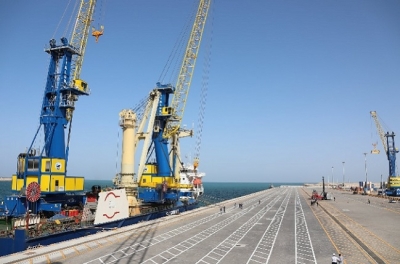With US sanctions waiver, India to continue operations at Chabahar port, facilitating trade for countries like Afghanistan

New Delhi, Nov 10 (IANS) Amidst the gloom among traders in Afghanistan over the closure of its border route by Pakistan, a new “opportunity has emerged” on its other side with the vast potential offered at Iran’s Chabahar port, facilitating transit of goods, say reports from Kabul.
The Afghanistan-Pakistan Joint Chamber of Commerce and Investment has announced that due to the closure of border crossings for business by Pakistan, traders from both countries have so far suffered over $100 million in financial losses, reported Tolo News.
According to the Chamber, the ongoing situation has created a sense of uncertainty over the future of trade between the two countries, with both sides incurring significant daily losses in transit and commercial exchanges, it added.
Meanwhile, Afghan officials told Pajhwok media on Monday that a new opportunity has emerged for Kabul “to make use of the vast potential of Iran’s Chabahar port, which could help boost exports, facilitate transit and pave the way for the country to become a regional transit hub”.
The Kabul Dry Fruit Exporters Union too stated that exports through Chabahar port are “currently running smoothly, with no problems in shipments to India”, added the report.
Director of the Office of the country’s Ministry of Commerce and Industry (MoCI) Mohammadullah Bakhtyar, while addressing a meeting on the port’s transit potential in Kabul, emphasised utilising Iran’s transit routes – particularly the Chabahar Free Economic Zone. He underlined the strategic importance, stating that it provided Afghanistan with access to open seas, quoted Pajhwok.
Incidentally, the United States recently extended a six-month sanctions waiver for India to continue its operations at the Chabahar port, effective from October 29.
India and Iran signed a 10-year agreement on May 13 last year to develop the Shahid Beheshti terminal. But the US Secretary of State revoked the sanctions exception issued in 2018 under the Iran Freedom and Counter-Proliferation Act (IFCA) for Afghanistan reconstruction assistance and economic development, effective September 29. The revocation rendered those operating the Chabahar Port or engaged in other activities attracting US sanctions. This sudden turn had raised legal, banking, and insurance obstacles for global companies working at Chabahar.
Now, India can continue developing and operating the terminal at least till April next year without facing punitive sanctions from Washington.
The port is crucial for India’s access to Afghanistan and Central Asia, allowing it to bypass Pakistan for trade and connectivity.
The extension was seen as a diplomatic win for India, especially amid broader tensions involving US sanctions on Iran and Russia.
The current waiver, valid until April 2026, gives India a window to continue operations and assess future developments. New Delhi is expected to use this time to strengthen its regional ties and infrastructure investments, particularly in light of evolving relations with the Taliban regime in Kabul. It is critical to India’s economic and geopolitical strategy for Central Asia and beyond.
For Afghanistan, the port offers access to the Persian Gulf and plays a vital role not only in reducing transport costs but also in increasing its trade with India, the Middle East, Central and South Asia, Africa, Europe, and America.
Bakhtyar also pointed out in his address that Afghanistan would benefit from various incentives at Chabahar Port, including a 100 per cent tax exemption for up to 20 years on capital and income, one-month free storage for transit goods, a 33 per cent discount on container unloading and 77 per cent on loading compared to other Iranian ports, as well as a 50 per cent discount on Afghan exports and imports and a 60-day tax exemption on mineral materials.
With the development work continuing, countries using the port can now expect major support in terms of logistics and technology.
–IANS
jb/vd





